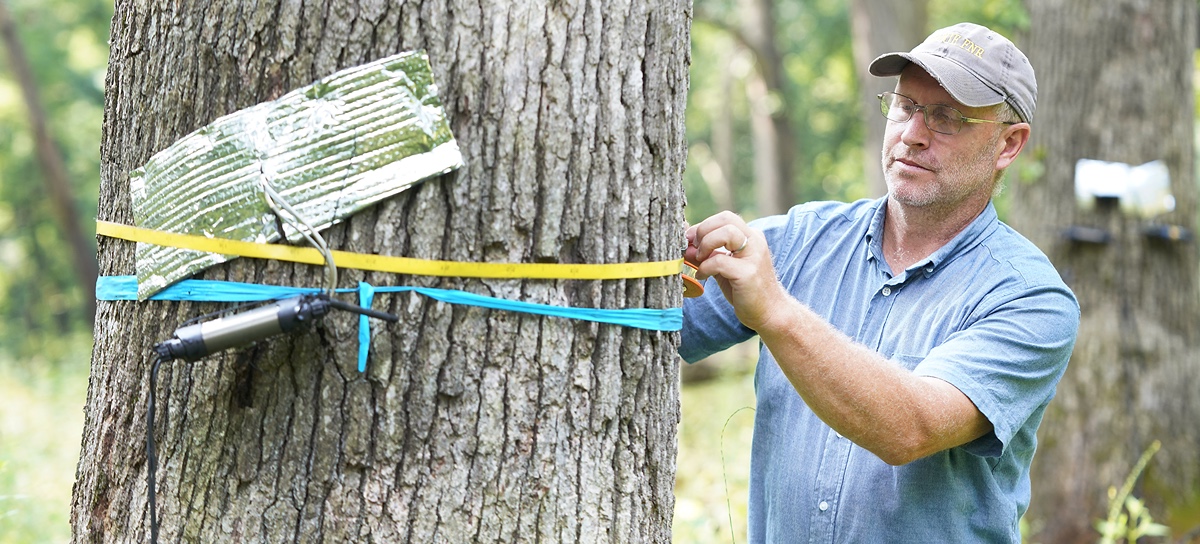Behind the Research: Brian Beheler
About the feature
Many people are involved in the remarkable range of programs, services and facilities that undergird research in the College of Agriculture. Collectively they’re integral to the college fulfilling its research mission. “Behind the Research” explores their individual roles. Each academic year, we profile six people whose work supports the College of Agriculture’s global reputation for developing innovative, multidisciplinary solutions to challenges and then putting those solutions into action.
Brian Beheler, Forestry & Natural Resources (FNR) County Properties Manager
- Facilitates research by creating structurally diverse habitats on FNR properties in Tippecanoe County.
- Conducts undergraduate workshops on tree planting, invasive plant management and chainsaw safety, and integrates relevant information into instructional field labs.
- Manages the land for long-term research opportunities and impactful use of FNR properties — “a legacy on the landscape.”
Brian Beheler went to work in construction after high school and figured he’d stay there. He didn’t rethink that plan until a few years later, when his younger brother was accepted at Purdue. “I figured if he can get in, surely I can,” he recalls. His brother studied aviation while Beheler, always drawn to the outdoors, chose forestry and natural resources, using his construction savings to pay for his first year of college.
After graduating from Purdue in 1997, he became a contractor, doing mostly timber stand improvement and grapevine removals for a private company. In 1999 FNR hired him to help manage its out-of-county properties in a position Beheler would largely shape himself over the next couple of years.
When the Hardwood Tree Improvement and Regeneration Center opened, the U.S. Forest Service asked him to lead their field operations. He worked for the regional group until 2012, stationed primarily out of Martell Forest.
Beheler applied for the open farm manager’s position in 2013, bringing full circle his commitment to the FNR properties he first worked on as an undergraduate doing seasonal labor in 1995. “Over time, it’s been neat to watch how the properties have changed, and how these different pieces of land and research plantings are utilized,” he says.
Beheler’s responsibilities fall into three major areas. The first is managing infrastructure like buildings, roads, fences and other physical places on the properties. Because these are key teaching and research areas, he must keep up with aesthetics like mowing and landscaping, but also ensure access by maintaining 22 miles of roads and trails, creek crossings and bridges. That includes maintaining and often transporting equipment across the state.
His second focus is on writing and administering land management plans, not only for forests but also for FNR’s wetlands, savannahs and prairies as well as wildlife food plots. These total about 1,600 acres on seven properties in Tippecanoe County. “It’s extremely diversified,” Beheler says. “That’s very challenging, and that’s what I love doing.”
The third pillar of his job involves coordinating research on the properties, which 10 different departments from agriculture and engineering use. Beheler sometimes must balance projects that may have incompatible impacts on other projects. He helps identify the best location for a research project, coordinates the logistics of setting it up and operates specialized equipment if requested.
He also teaches or assists in instructional field labs — 13 of them this past year.
This summer Beheler walked through the woods with summer forestry interns and encouraged their educated guesses as to its history and future. In giving tours to visitors, from fourth-grade classes to international scholars, he addresses forest structure, invasive issues, interaction of species, and distinctive ecosystems and their associated plant and animal species.
He relies on one full-time staff member, fellow FNR alumnus Clayton Emerson, and student help. “I’m using the students to get work accomplished if needed, but I’m also training them,” he says. Many students credit this hands-on experience with helping them land a professional position.
Beheler especially likes to interlace research, education and extension opportunities for a piece of property. He cites as an example 10 acres where he ultimately wants to regenerate white oak. On this property, students have learned about prescribed fire, chainsaw use, timber sales and tree planting. Classes have used it for regeneration assessments and to study vegetation response to sunlight. A master’s student conducted research on fire and acorn germination rates. A faculty researcher studied fire’s effects on amphibians and snake, while another studied avian responses to forest changes. Several Extension programs have utilized the site covering oak regeneration, deer protection, prescribed fire and professional trainings.
“That one 10 acres has provided many opportunities across all of our mission areas,” Beheler says.







